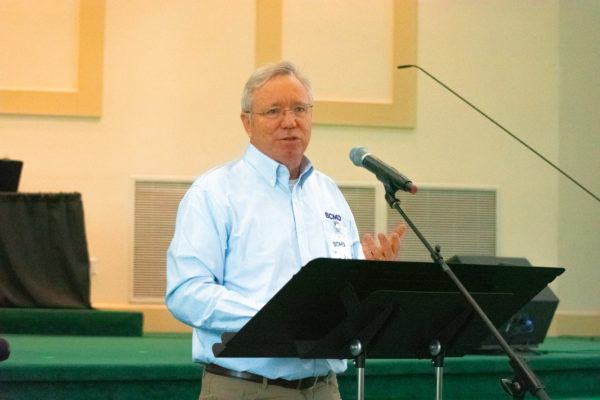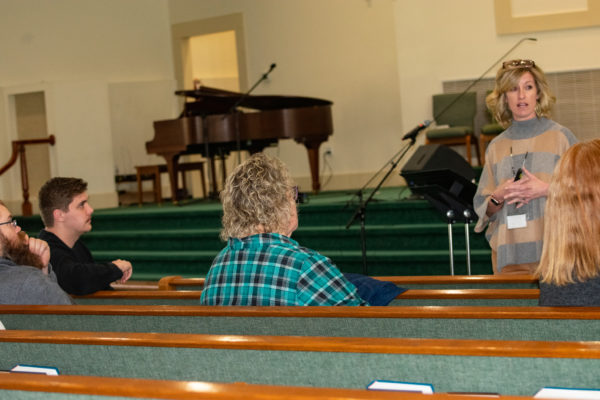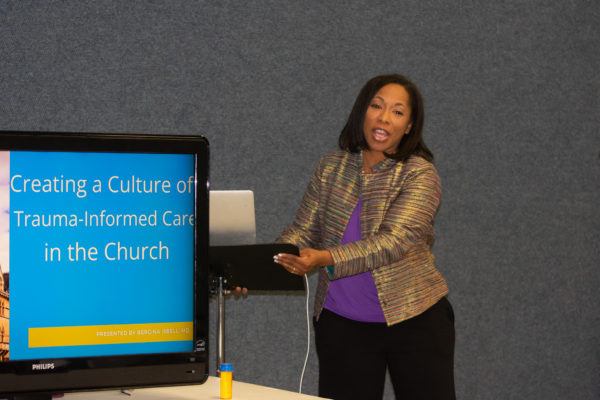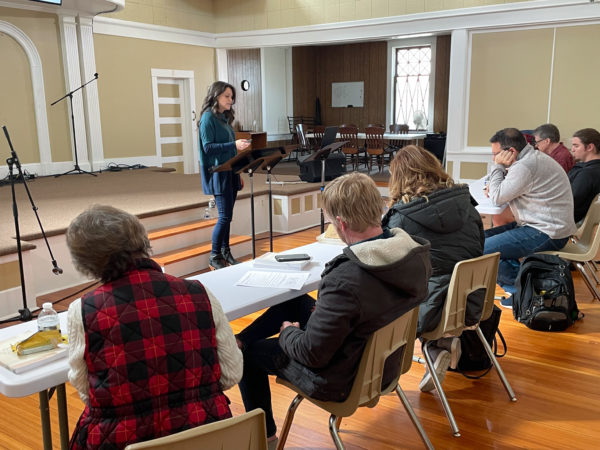Pathways Conference Addresses Safety, Caring, and Trauma

GREENSBORO, Md. – “It’s not that big of a problem.” Sixty-six percent of sexual abuse victims don’t talk about the abuse until they’re adults. Do we really know how safe our churches are? The Pathways: Prevention and Protection (Pathways) conference, the first of three scheduled this spring, is an important step forward in equipping churches in keeping their members safe and ministering to victims and those who have been traumatized from past abuse situations.

Dooley, speaking of abuse in the church, said, “This is not an issue that we need to mitigate. This is an issue we need to eliminate” (photo by Sharon Mager).
Mark Dooley, BCM/D interim director, presented an overview of the need for prevention and protection. “This is not an issue that we need to mitigate. This is an issue we need to eliminate,” Dooley stated.
He also emphasized the need for reporting abuse. There are two components to the issue, he explained. Matthew 18 refers to immoral situations, and the church should address them; Romans 13 addresses those that are illegal and should be referred to the proper authorities. “If it’s a crime, it needs to be reported,” Dooley stated, acknowledging that it’s not an easy thing to do but necessary.
Dooley also discussed the need for spiritual care to restore the abuser.
Several attendees shared their experiences regarding abuse in the church and its toll on victims, pastors, leadership, and the congregation.
Referring to the Pennsylvania Coalition Against Rape, BCM/D Associate Executive Director Tom Stolle shared that 90% of individuals affected by disabilities will be sexually assaulted in their lifetime. And of the ones sexually assaulted, 49% will experience sexual assault ten or more times. Stolle, the father of a non-verbal adult son with special needs, said, “This is horrifying to me.”
Stolle prayed that attendees would leave the conference with a “fire in their belly” to protect the vulnerable.
BCM/D Children’s and Youth Ministry Consultant Kris Buckman, Dr. Bergina Isbell, and Counselor Eliza Huie led breakout sessions. Buckman shared about creating a prevention plan; Isbell discussed creating cultures of care, and Huie shared about discovering hidden trauma in the church.
Building the right fences
Buckman shared concrete ways to protect the vulnerable, especially children and youth. She emphasized that background checks, while essential, are not enough.

Kris Buckman used an illustration of a fence to demonstrate that background checks are not enough to protect the vulnerable (photo by Sharon Mager).
Attendees watched a video about a man who had assaulted over 1,000 victims before being criminally prosecuted. “A background check is only good if someone has been caught. Unfortunately, almost 90% of abusers never encounter the criminal justice system, so, in many cases, there’s nothing to find in a background check, and sexual abusers know that,” said Buckman. Others have plea-bargained down to lesser charges. Buckman stressed that background checks would not help in these situations, adding that knowing what “red flag” offenses to look for is essential.
“It’s like making sure you’re building the right kind of fence. If you have a garden and you’re trying to keep out the deer, you’re going to build a fence with a lot of barbed wire around the top, and that’s like our background checks,” Buckman explained. “That only keeps out a small percentage of what can invade your garden. Think about the rabbits and the squirrels. You have to build the right type of fence so no one comes in. Background checks are great, and you have to have them, but they’re really a minimal layer of protection.”
Remember, too, that the majority of criminal records for those under 18 are sealed and won’t show up on background checks, Buckman stressed. “One misconception is that abusers are always adults,” she added. Peer-to-peer abuse is on the rise. Buckman said, “Kids are inundated with pornography.” They’re also naturally curious. As a result, a lot of exploration and abuse occurs in schools, churches, and on playgrounds, behind sheds, in playhouses, and behind the church. “Background checks do nothing to help in this situation,” she emphasized.
During the breakout, Buckman discussed best practices with a reminder to never work with children alone.
She shared ways churches can protect the vulnerable by reducing risks and preventing predators. In addition, she provided many resources, some of which will be available in the upcoming issue of BaptistLIFE magazine and on a new Pathways website page that will be online this spring.
Culture of caring
In another breakout, Isbell shared ways churches can cultivate a caring culture.
She emphasized the need for churches to be sensitive to trauma in the church. “We at the church deal with people with baggage,” she said. She emphasized being careful of potential trauma “triggers.”

Isbell shared about ways churches can create a culture of caring (photo by Sharon Mager).
She used the story of the rape of Tamar, King David’s daughter in II Samuel, as an example of what could cause distress in some people. Isbell, who said she has been in church her whole life, heard the story of Tamar many times, and it’s a troubling account. “I’ve never had a pastor say, ‘I’m going to read about something that may be difficult to someone,’” she said. “In the secular culture, they call it a ‘trigger warning.’ Doing that as a pastor goes a long way. You’re not only saying you’re willing to listen and to be a safe space, but (you’re saying), ‘I kind of understand a little bit of what you’re going through, and that me even talking about this could be a problem for you.’”
A pastor can also let people know that if they have a problem or are responding to what is being taught, he is there for them and willing to listen.
Hidden trauma
Eliza Huie shared about hidden trauma. Huie explained the physical processes that occur during trauma. In a traumatic situation, the pre-frontal cortex, affecting reasoning, logic, and language, goes offline “It’s still there, but think of it as the volume is turned down. So, if you ask someone in a traumatic episode what’s wrong, you won’t get a logical response,” Huie said.
“That is not the moment to talk to them about what the Scripture says about the situation,” she stated. “How does God want you to think about this now?” are great words, but the person has no idea in this situation how to answer because their pre-frontal cortex is offline. The limbic system is taking over, and their body signals an alarm that there is a perceived danger.
She shared that trauma can sometimes hide behind anxiety and fear, sadness, unexplained body aches and pains, muscle tension, guilt, heart racing, nightmares, fatigue, anger, oversharing, difficulty concentrating, and other symptoms.
Q&A and discussion
Following the breakout sessions, attendees enjoyed a fellowship lunch. Members of the BCM/D Sexual Abuse Task Force were available for Q&A and discussion.

Huie leads a session on how trauma hides within the church (photo by Sharon Mager).
Asked about common unsafe practices in churches, Buckman reiterated that allowing one person alone to work with children is unsafe. Having a two-deep policy protects children and adults. Dooley added that it might mean canceling events or services, but it’s essential to have at least two people working with kids and youth. Buckman also said going into the bathroom with children is also not a safe practice.
Isbell added, “All churches have blind spots.” She suggested an assessment to help leaders identify those areas. She also spoke regarding the necessity of written policies and procedures.
Tom Stolle agreed with Isbell and added that insurance companies are and will be requiring safety procedures in place as a requirement to being insured.
In closing, Dooley said, “The Pathways initiative is about navigating a path to provide protection now and ongoing.”
He said, “People say, ‘This has never happened in our church. Why are we doing this? Do you suspect us of having done something?’ And the answer is ‘no.’ We’re not looking at the past. We’re looking ahead to the future. We want to be forward-thinking.”
If you missed the February event, register for one of two more this spring — Apr. 30, at Cresthill Church in Bowie and June 4 at Mountain City Church in Frostburg. Register online at bcmd.org/events.
Cover photo: Several members of the Sexual Abuse Task Force answered questions at Pathways. Pictured l-r: Isbell, Stolle, Buckman, and Keith Myer (photo by Sharon Mager).
Sharon Mager is a communications specialist for the Baptist Convention of Maryland/Delaware.
